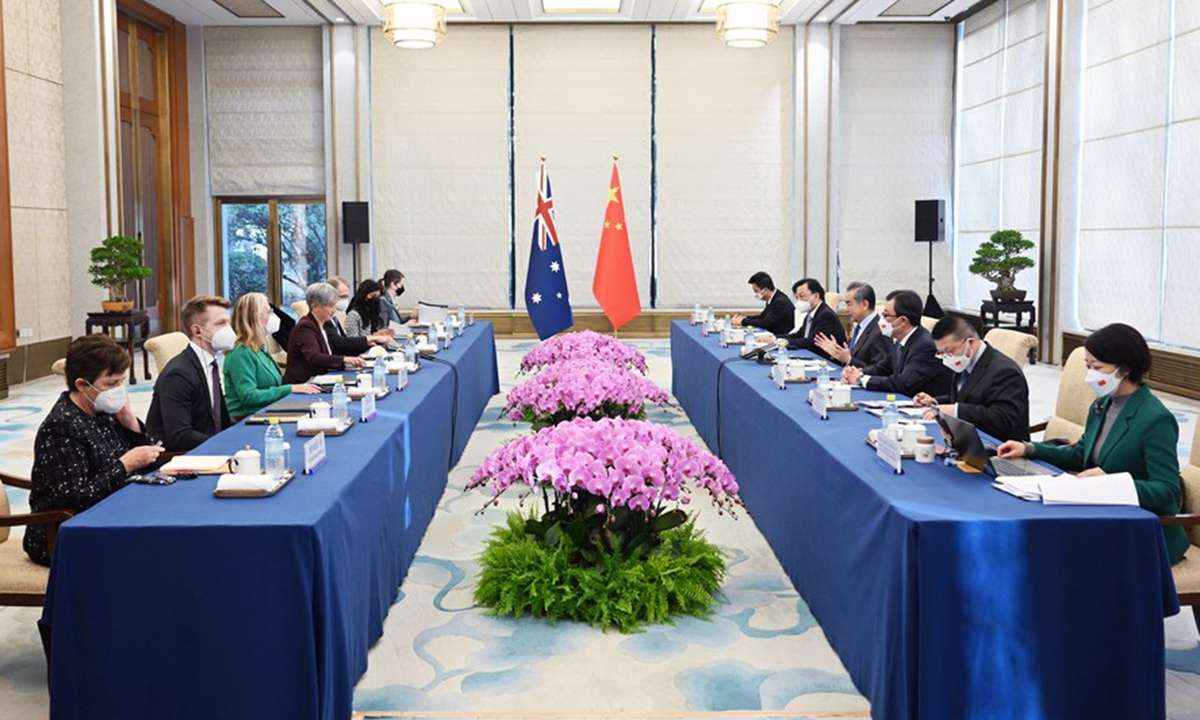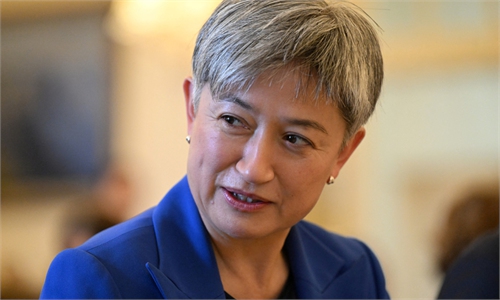
Chinese State Councilor and Foreign Minister Wang Yi, also a member of the Political Bureau of the Communist Party of China Central Committee, and Australian Foreign Minister Penny Wong hold the sixth China-Australia Foreign and Strategic Dialogue in Beijing, capital of China, December 21, 2022. Photo: Xinhua
Chinese State Councilor and Foreign Minister Wang Yi and Australian Foreign Minister Penny Wong held the sixth China-Australia Foreign and Strategic Dialogue in Beijing on December 21. A joint outcomes statement was issued after the dialogue.The two sides agreed to maintain high-level engagement, and to commence or restart dialogue in six areas which effectively embrace all important aspects of China-Australia exchanges. The message is unmistakably clear: the Wang-Wong meeting was productive and fruitful, signaling a full-scale reset of China-Australia relations. The dialogue, while candid and open, was constructive and substantive, with the practical aim to set out the roadmap for further development and progress to bring the bilateral relations to a new height.
Differences and disputes between countries are obviously inevitable, but such disparities should not be unnecessarily amplified or distorted so as to jeopardize the healthy development of bilateral relations. Of course with one dialogue we cannot expect to eliminate all the problems, but without open dialogues and communication, there could be no settlement to the problems at all. Due to internal or international factors, in the previous years a number of issues remained unresolved or embroiled in controversy. The recent dialogue in Beijing is an important step of pragmatism to exchange opinions and seek solutions.
Since the Labor Party came to power after the federal parliament election in May, the Albanese administration has always emphasized that it is a "new" Australian government, which indicates a perceived determination to set itself apart from the previous Morrison government. There is a distinct desire in Canberra to adopt a new approach to Australia's relations with China. The wind of change has been gradual but steady, conducive to the warming up of China-Australia relations.
Nonetheless, difficulties still linger and uncertainties need to be clarified. During the dialogue, Wang noted that both sides should abide by the commitments made when establishing diplomatic relations, adhere to a correct mutual understanding and a mature way of getting along with each other, and maintain the stability of policies. In other words, it is expected that Canberra needs to demonstrate and sustain policy consistency in order to maintain the momentum of the improvement of the bilateral relations.
The previous Australian governments under Malcolm Turnbull and Scott Morrison had characterized themselves with unpredictability and changeability in their rhetoric and policies. Their words and deeds often failed to match. On various occasions they would make seemingly positive statements about the maintenance and promotion of Australia's partnership with China while, in practice, they endeavored to sabotage the healthy and constructive bilateral relations. Their statements were inherently self-contradictory, with subsequent ones always overturning previous ones.
Such inconsistencies of policies and practices of the previous Australian governments had brought confusion and uncertainty for China to grasp, fathom and judge Canberra's true intent, which in turn had affected the policymaking at both sides. It remains a serious worry that such changeableness in Canberra's policy setting would recur, which could once again disrupt and affect the sound development of bilateral ties in the future.
Thus, Wang's outspokenness in making this critical point serves as a premonition. China never attempts to dictate other countries, but we have reason to be wary of inconsistencies, which should by all means be avoided in order to sustain smooth exchanges and cooperation between our two countries in the future.
Predictably, the US-led West would be displeased at the prospect of the improvement and strengthening of China-Australia relations. Especially against the background that the US has been desperately trying to entice and enlist its allies and partners to contribute to its Indo-Pacific strategy with the professed target to contain, deter and frustrate China's development, Washington would spare no effort to exploit differences in the China-Australia relationship, to instigate conflicts and confrontations.
At the time of Wong's visit, former Australian prime minister Kevin Rudd was appointed as Australia's next ambassador to the US. With his experience and expertise in international relations and politics, in particular with regard to China, the veteran politician's appointment indicates that Albanese is fully aware of the importance of the China factor in Australia's foreign relations. We expect Rudd to play a conducive role to promote and maintain a constructive and unbiased approach in Australia's diplomacy.
With the success of the Wang-Wong meeting, Australia needs to show determination and sincerity to make substantial improvement of the bilateral relationship based on mutual respect, which is the fundamental principle to solve international problems. Moreover, it is necessary for both sides to correctly view the differences between us, recognize them, control them, and practically transcend them.
China has never imposed its own ideology or values on Australia, never demanded it to conform to China's political system, ways of governance, social models or culture. We respect Australia as a sovereign country with its own way of life. Needless to say, we do not accept other countries to force their political views on us, or to make demands and stipulations to our key values and our way of life.
The most important point, therefore, is that Australia must be cautious not to provoke challenges to China's national core interest. Should redlines touching upon China's sovereignty and territorial integrity be crossed, China will resolutely rise to defend its interest at any cost.
Australia's new government is now on the right side of history when it works conjointly with China to steer the bilateral relations to the right track. There is much room for further and more cooperation between us in the future. For next year, we look forward to a new page in our relationship, and a new height to bring more benefits for both our countries and peoples.
The author is president of the Chinese Association of Australian Studies and director of the Australian Studies Centre at East China Normal University. opinion@globaltimes.com.cn

